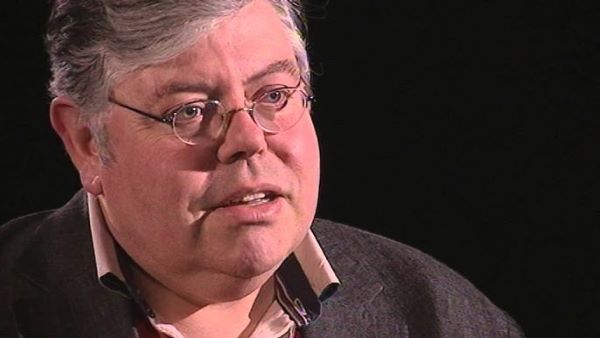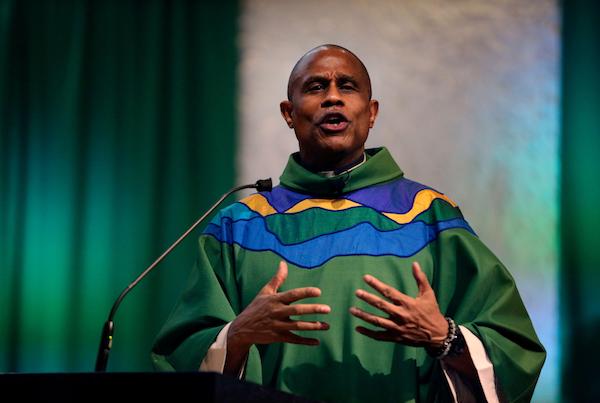Seminary formation needs to deal with racially-based power dynamics, according to a theologian who has studied the impact of clerical sexual abuse in African American communities.
Addressing the Spirit Unbound assembly this week on the theme “Unbinding our Stories – Black and Asian people’s stories of clerical abuse”, Fr Bryan Massingale, a professor at Fordham University, said the Church needs to talk about how race and ethnicity intersect with power and sexuality.
The American priest, who conducted the first in-depth study on clergy sexual abuse in African American communities warned: “It is not enough to simply talk about everyone going through ‘safe environment’ training. That’s the low hanging fruit.
“We need to talk about how race and ethnicity intersect with power and sexuality and say you cannot be ordained or you cannot exercise ministerial leadership in the Catholic Church without having seriously engaged with this as part of preparation for ministry.”
He said history had shown that the Church’s leadership would not make changes voluntarily, but only when forced to do so.
From his research, he had found that Black male victims of clerical abuse do not feel able to own the title of “survivor”, but saw themselves as coping.
The prevalence of white leadership and white victims communicated a message that there was no room for the trauma experienced by victims of colour of clerical sexual abuse.
“That is how racism has affected African Americans and communities of colour – we are invisible,” he said.
This was compounded by the “historic lack of sensitivity” the Church had shown Black Catholics in the US in terms of the closure of their parishes, the merger of their schools, the abandonment of their communities.
“Often these plans have taken place without any real meaningful consultation with the Black catholic community,” he said.
Highlighting some of the barriers for victims of clerical abuse in the African American community, he said some of the terminology used didn’t resonate with African Americans.
“Another barrier is that many of those who are charged with being the point of contact in dioceses and religious orders lack the cultural competence to listen and to be present to Black people or others of colour.”
“One of the things I’ve come across in my research is that some victim assistance coordinators are unaware or unfamiliar with inner-city neighbourhoods – they don’t know how to speak with Black men.
“And Black people find it very hard to be vulnerable and to talk about the intimate violation of their body to someone who may look like the person who did this harm to them.”
Another issue that needed to be addressed he said was how “bodies of colour are sexually coded or understood in society, especially Black women who are seen as loose and promiscuous and Black men as sexually rapacious and irresponsible.
“Therefore, there is a kind of presumption that in many cases the victims did something to bring [the abuse] on.”
Another barrier for Black men was the fear of bringing their testimony to law enforcement.
“There is a long history of distrust of the law enforcement community in the Black community for many reasons going back generations. So there is a real hesitancy to do that especially if by doing so I may call attention to the fact that I may have a parole violation or something like this.”
“I think these are all barriers that people of colour experience and have experienced when it comes to bringing forth their stories to be heard in the faith community.”
Drawing from his own research for the “Taking Responsibility” initiative at Fordham University, Fr Massingale recalled how one victim had said to him, “They don’t even believe white victims, why are they going to believe me?”
He also underlined that importance of understanding the shame that surrounds a same-sex violation in the African American community. “That can be quoted as anti-LGBTQ prejudice, but I want to highlight the difficulty that Black men may experience in reporting being sexually violated especially by a white man.”
“It is a very sensitive topic, but we need to talk about it because it is very relevant to this issue. For a Black man to have to admit publicly that he has lost control of his own sexual body and that this happened by a white man – I can’t imagine that too many Black men would want to admit to that publicly. And then they have to admit that that happened to another white person – that can be even more traumatic,” he said.
“We need to look at how race has been used as a power means to basically subjugate people and to let them know that they are not in charge or control.
“That is a dynamic that we don’t know how to talk about in our culture. I think that is another layer of complication – an obstacle to people feeling free to share their stories of a trauma and violation especially in church settings.”
Sr Josée Ngalula spoke to the Spirit Unbounded assembly on the theme, “Breaking the Silence in Africa”. A Sister of St Andrew from the Democratic Republic of Congo, Pope Francis appointed the 61-year-old as the first-ever African woman to be a member of the International Theological Commission.
Sr Ngalula teaches in several theological institutes in Africa and is professor at the Faculty of Theology in the Catholic University of Congo and also at the Al Mowafaqa Ecumenical Institute in Rabat, Morocco.
She gave a summary of the survey she conducted in DR Congo in which she listened to survivors of sexual abuse in the African context.
She said they had emphasised in their testimony that the perpetrators of sexual abuse are both men and women.
In relation to clerics, the abuse was mainly perpetrated in the context of an abuse of authority, such as in the role of chaplain to a convent or while undertaking the role of spiritual accompaniment.
Perpetrators used “misinterpretations of Bible verses” to convince nuns and pious women that they are “wives of Christ and if you are a wife of Christ, you must give both your soul and body to Christ”.
The next step involved another misinterpretation. “They convince them that the cleric represents Christ and because clerics represent the Christ, you have to give the cleric your soul and your body.”
She highlighted that confession had been used by some clerics to blackmail women.
“When a married woman or nun goes to confession and says that she has sinned, for example an abortion or adultery, the cleric takes this information and begins to blackmail the woman to force her into sexual interactions, otherwise he will denounce her.”
She explained that some of the perpetrators of this abuse also used cultural insinuations that virginity causes disease. “In this context they manipulate the mind of the victims to force them to accept the rape, not as a rape but as a manifestation of love.”
The research also showed that the perpetrators are also members of the laity such as women abused in the context of medical consultation.
“We have doctors who rape women in the context of a gynaecological consultation. We have also laity who are in positions of power such as politicians, the military, or rich men who kidnap nuns or women in the context of good parishioners…good Catholics in their parishes who trap the women in their houses and rape them.”
Sr Ngalula highlighted that some nuns in positions of authority in religious life were perpetrators of abuse, in some cases a superior or a nun training young aspirants.
“They make homosexual rape in the context of an abuse of authority, threatening postulants or novices that if they refuse, they will give a bad report and they will not be admitted for the vows. So it is blackmail.”



 Loading ...
Loading ...